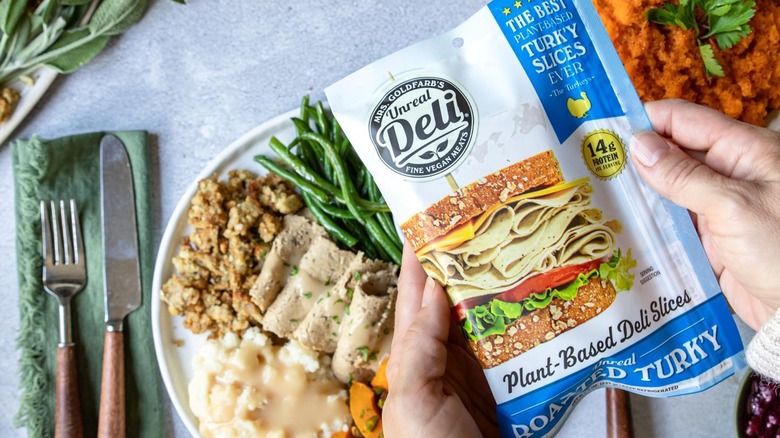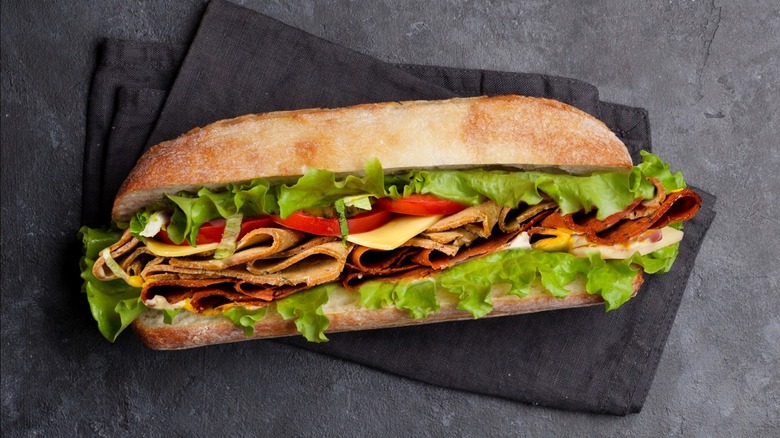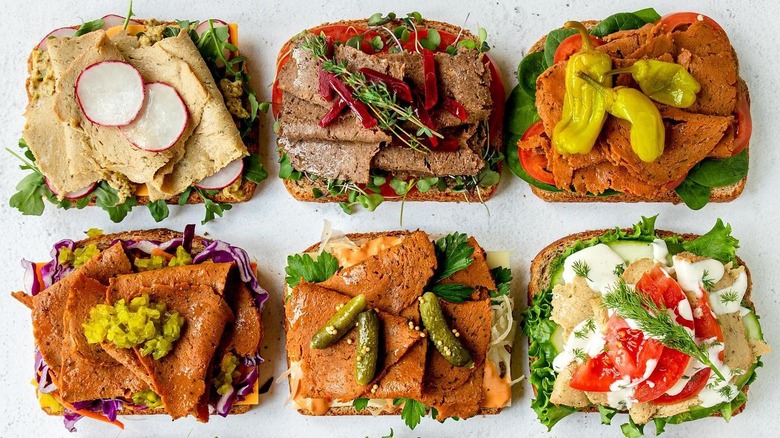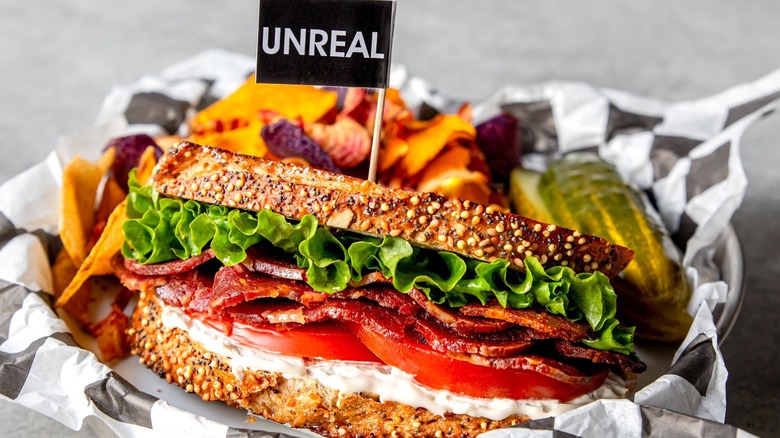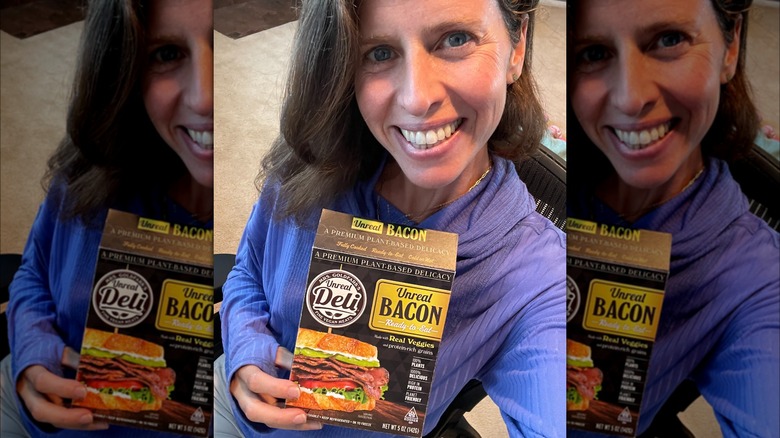Mrs. Goldfarb's Unreal Deli: Here's What Happened After Shark Tank
Plant-based meats are more popular now than ever before, and the demand for them is only projected to grow further in the years to come. A huge part of the flourishing industry has been innovation. Gone are the days when shoppers could only find vegan chicken, bacon, and sausages: Now, there are plant-based alternatives to just about every popular meat — even seafood in fact! However, up until Jenny Goldfarb walked into season 11, episode 8 of "Shark Tank," quality deli meats were a glaring exception. Her company, Mrs. Goldfarb's Unreal Deli, claimed to be the only one making premium plant-based deli slices in the whole world.
Goldfarb came from a family whose history was closely tied to delis. Her great-grandfather had immigrated from Romania to the U.S. as a young teen. He then worked his way up from being a dishwasher at a New York deli to owning and running several of them in the city. Safe to say, love for all things deli ran in her blood.
So when Goldfarb decided to turn vegan years later, she began experimenting with meat-free homemade versions of her favorite corned beef and pastrami sandwiches that she sorely missed. Armed with vegan cookbooks, she turned to fresh produce and grains for a solution. And that's how Mrs. Goldfarb's Unreal Deli was born — a company that sold low-carb, low-fat corned beef deli meat slices made from 100% plant-based ingredients like beets, chickpeas, and tomatoes.
What happened to Mrs. Goldfarb's Unreal Deli on Shark Tank?
Jenny Goldfarb appeared on "Shark Tank" only a few episodes after Atlas Monroe and its vegan chicken did, but where the latter left without a deal, the plant-based deli meats had better luck. The vegan meats were a quick hit in the Tank for more reasons than one: They tasted great, were low in fat and carbs, and a two-ounce pack contained only 100 calories — all things that the Sharks liked.
However, Daymond John had his concerns. Mrs. Goldfarb's Unreal Deli was only a few months old and had made no more than $10,000 from sales at local Los Angeles-based delis. This made John question Goldfarb's ask for a $100,000 investment in exchange for 10% of equity, which brought the company's valuation to a million dollars.
Goldfarb justified her valuation by explaining that she already had interest from outside investors. Plus, the vegan meats were slated to launch in 58 Whole Foods stores the following month, giving her business more credibility. That was enough to convince Mark Cuban and Kevin O'Leary. Though O'Leary was willing to invest the $100,000 in exchange for a 20% stake in the business, it was Cuban whose deal the entrepreneur accepted. A vegetarian himself, Cuban made Goldfarb an offer that viewers don't see very often: He too wanted 20% of equity but offered to invest $250,000 in exchange, which was more than double what Goldfarb originally asked.
Mrs. Goldfarb's Unreal Deli after Shark Tank
Mrs. Goldfarb's Unreal Deli benefitted immensely from the publicity that the show brought. Jenny Goldfarb told Vegan Business Media that Unreal Deli had made $60,000 worth of sales from its online store overnight after its episode aired (per YouTube). She made another $30,000 over the next three days, bringing the company's early sales to nearly $100,000. In six months, those sales had reached $300,000. Wholesalers, grocery stores, and restaurants also came knocking on Unreal Deli's doors after watching the show. The entrepreneur went on to add that the show gave her credibility as a business owner, helping her get meetings with key industry members even years later.
Mrs. Goldfarb's Unreal Deli also launched in 58 Whole Foods stores across the Southern Pacific Region as the entrepreneur had promised. However, instead of the plant-based corned beef slices, Unreal Deli sold pre-made grab-and-go sandwiches at the store — complete with vegan Russian dressing and a whole-grain seeded roll.
The deal with Mark Cuban was also finalized. A year after "Shark Tank," Cuban told the New York Post that, "[s]ales are really, really good — better than I imagined. I never saw it happening this fast. In particular, we have distributors around the world now. I didn't see that coming." Unreal Deli's annual revenue was projected to reach $3 million in 2020, and Cuban thought that it even had the potential to turn into a $50 million business.
Is Mrs. Goldfarb's Unreal Deli still in business?
Mrs. Goldfarb's Unreal Deli is still in business and has grown exponentially with Mark Cuban's backing. Jenny Goldfarb's original plan was to sell the vegan deli meats to restaurants and fast food chains. However, COVID-19 forced the entrepreneur to pivot and focus on supermarkets instead. Unreal Deli revamped its packaging to make it more store-friendly and expanded its retail presence to chains like Wegmans, Ralphs, HEB, Giant Food, and Sprouts. Goldfarb also designed special 1.5-pound bulk packs of the deli meats to sell them at 40 Costco stores in Southern California and Hawaii. By March 2023, Mrs. Goldfarb's Unreal Deli had made its way to 3,600 locations across the country, and the company continues to sell its vegan deli meats through its website too.
Goldfarb also rolled out more products in addition to the original Corn'd Beef to keep up with the retail expansion. She first worked with white cannellini beans and chickpeas to come up with the Unreal Roasted Turkey – and then used a combination of shiitake mushrooms, lentils, and black rice for her Unreal Steak Slices.
Reflecting on the tumultuous time, Goldfarb told CNBC that the move to retail "saved the business ... and made this whole nightmare story into something really wonderful." Thanks to Cuban's advice and changed strategies, Unreal Deli made its way to Instacart's list of the fastest-growing emerging brands of 2022 — joining fellow "Shark Tank" businesses Poppi (formerly known as Mother Beverage) and Slate.
What's next for Mrs. Goldfarb's Unreal Deli?
Mrs. Goldfarb's Unreal Deli has come a very long way since "Shark Tank.” The company announced a series A funding in 2022 that included investments from Aileen Getty among others. Mark Cuban also put up another $500,000, bringing his total investment in the vegan deli meats to $750,000. Although the total amount of money raised is unclear, Unreal Deli was valued at $50 million by investors during the round. Considering the funding and the prestigious panel of investors, Unreal Deli will likely continue to grow.
While Unreal Deli will probably work on expanding its retail presence in the U.S. even further, it's possible that the vegan deli meats may make their way to stores, restaurants, delis, and fast food chains across the borders as well. Additionally, new items may also be on the cards.
Jenny Goldfarb had previously told the Los Angeles Magazine that she wanted to "show the world that all the finest deli products can be made of plants." The entrepreneur also admitted to Vegconomist that, "[f]ood like ours keeps people from needing to eat an animal to have a good sandwich. And that's the goal." Plus, since launching the plant-based turkey and steak slices, Goldfarb has also rolled out vegan bacon. So chances are, fans might see more vegan versions of their favorite deli sandwich fix-ins in the future — perhaps even an alternative to chicken or ham.

